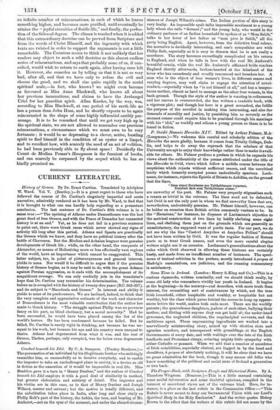Crushed beneath his Idol. By C. A. Sampson. (Tinsley Brothers.)—
The personation of an individual by his illegitimate brother who strikingly resembles him, so successfully as to deceive everybody, and to enable the impostor to take an unchallenged place in society, is a device as old in fiction as the execution of it would be impossible in real life. Miss Wadden gave it a turn in "Henry Dunbar," and the author of Crushed beneath his Idol employs it with a good deal of similarity in method, but greater elaboration and subtlety of detail. The impostor and his victim are in this case, as in that of Henry Dunbar and Joseph Wilmot, master and servant; but the motive is totally different, and the substitution takes place in India, after long and close study on Philip Ron's part of the history, the habits, the tone, and bearing of Mr. Amherst—not on the spur of the moment, and under the absurd circum-
stances of Joseph Wilmot's crime. The Indian portion of this story is very faulty. An impossible ayah talks impossible sentiment to a young lady whom she calls " dorsani ;" and the young lady, who would in the ordinary parlance of an Indian household be spoken of as "Mom Sahib," talks to her lover of her father as "mon pore le Sahib," all the party being English. Apart, however, from the defective local colour, the narrative is decidedly interesting, and one's sympathies are with Philip Rolt, especially as it is easy to discern that he is not really a murderer. The story becomes exceedingly complicated on his return to England, and when he falls in love with the real Mr. Amherst's beautiful cousin, while the real Mr. Amherst's affianced bride reaches England shortly afterwards, broken-hearted at the falsehood of the lover who has causelossly and cruelly renounced and forsaken her. A man who is the object of four women's lives, in different senses and varying degrees, may well claim to engage the attention of novel- readers,—especially when he "is not himself at all," and has a tempes- tuous mother, almost as hard to manage as the other four women, in the back-ground. Though the style of the author is wanting in refinement, and her canvas is overcrowded, she has written a readable book, with a vigorous plot ; and though her hero is a great scoundrel, she fulfils the purpose of the novelist in making him interesting, and also the demands of morality and justice, by punishing him as severely as the sternest censor could require him to be punished through his marriage with his "idol," as worldly and odious a young person as there is to be found in fiction.






































 Previous page
Previous page